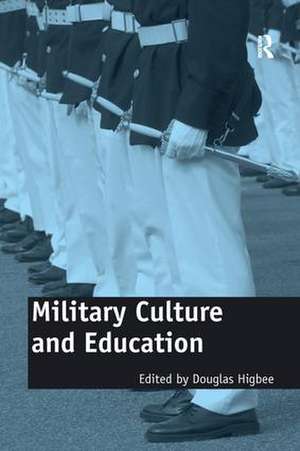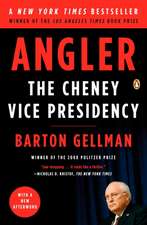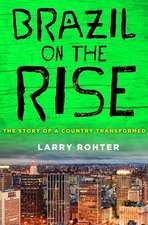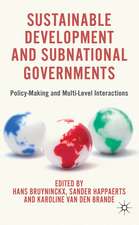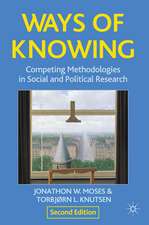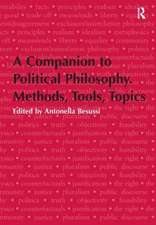Military Culture and Education: Current Intersections of Academic and Military Cultures
Editat de Douglas Higbeeen Limba Engleză Paperback – 17 oct 2016
| Toate formatele și edițiile | Preț | Express |
|---|---|---|
| Paperback (1) | 469.34 lei 43-57 zile | |
| Taylor & Francis – 17 oct 2016 | 469.34 lei 43-57 zile | |
| Hardback (1) | 1054.71 lei 43-57 zile | |
| Taylor & Francis – 8 oct 2010 | 1054.71 lei 43-57 zile |
Preț: 469.34 lei
Nou
Puncte Express: 704
Preț estimativ în valută:
89.82€ • 93.24$ • 74.89£
89.82€ • 93.24$ • 74.89£
Carte tipărită la comandă
Livrare economică 24 martie-07 aprilie
Preluare comenzi: 021 569.72.76
Specificații
ISBN-13: 9781138256798
ISBN-10: 113825679X
Pagini: 208
Dimensiuni: 156 x 234 x 11 mm
Greutate: 0.45 kg
Ediția:1
Editura: Taylor & Francis
Colecția Routledge
Locul publicării:Oxford, United Kingdom
ISBN-10: 113825679X
Pagini: 208
Dimensiuni: 156 x 234 x 11 mm
Greutate: 0.45 kg
Ediția:1
Editura: Taylor & Francis
Colecția Routledge
Locul publicării:Oxford, United Kingdom
Notă biografică
Douglas Higbee, University of South Carolina, Aiken, USA
Recenzii
'Although the military and academy instinctively butt horns, the teaching professionals in the military academies and advanced military schools are hard at work to infuse the humanities into a total education. The good news from this book is that we continue to live in a culture that values the individual - a vital notion for soldier, commander, and citizen.' Donald Anderson, Editor of War, Literature & the Arts 'The different perspectives that Higbee presents help the reader rethink the image of the military as a large, bureaucratic institution that never changes, deviates, or questions its procedures and standards. In fact, Higbee’s collection offers a gallery of people who show us that the military culture is adapting to higher education practices to improve its own training programs. The general lack of understanding of military culture makes this book relevant for everyone in higher education who works with or supports students who have military service... This book will be valuable to those who wish to increase their understanding of the military culture, customs, and mores from which student veterans come. This book is thus valuable for both civilian and military faculty. Both cultures need highly skilled faculty to effectively teach the leaders of tomorrow.' The Review of Higher Education 'This collection is a useful introduction to the world of cadet and professional military education, and many of its authors deliberately set out to deconstruct stereotypes they have encountered or perhaps once had themselves... Many of the authors do not shy away from criticism, and present a nuanced and complicated review of their experiences... this text is essential reading for those in the chain of command (in both Canada and the US) who remain less than supportive of broad-based education in both military academies and civilian universities as opposed to technical education or training, as well as their political overlords who approve funding for such programs. Th
Cuprins
Preface; Introduction Intersections, Douglas Higbee; Part I Intersections In and Out of the Field; Chapter 1 Real Officers Don’t Teach Keats: The Naval Academy, ROTC, and Military Spiritualism, Edward F. Palm; Chapter 2 Combat Ethnography, Carol Burke; Chapter 3 An American Professor with the Iraqi Army, Andrew H. Myers; Part II Military Academies and Humanistic Inquiry; Chapter 4 Teaching Citizen Soldiers: Civic Rhetoric and the Intersections of Theory and Practice at the Virginia Military Institute, D. Alexis Hart; Chapter 5 Rethinking the Culture Wars at the Naval Academy, Jeffrey S. Sychterz; Chapter 6 Literature, Identity, and Officership, Andrea Trocha-Van Nort; Chapter 7 Teaching English at West Point: A Dialogic Narrative, Karen P. Peirce, Major David C. Wood; Chapter 8 Cocked and Ready: The Humanities and Homosociality at the Royal Military College of Canada, Huw Osborne; Part III Teaching in Professional Military Schools; Chapter 9 Navel Gazing Google Deep: The Expertise Gap in the Academic-Military Relationship, Thomas Bruscino; Chapter 10 Professors in the Colonels’ World, Daniel J. Hughes; Chapter 11 No “Holidays from History”: Adult Learning, Professional Military Education, and Teaching History, Bradley L. Carter;
Descriere
While studies of American military culture have proliferated in recent years, and the culture of academic institutions has been a subject of perennial interest, comparatively little has been written on the ways the military and academe intersect. These essays offer both ground-level perspectives of the classroom and campus, and well-considered articulations of the tensions and opportunities involved in training civic-minded soldiers on the issues especially important in the post-9/11 world.
